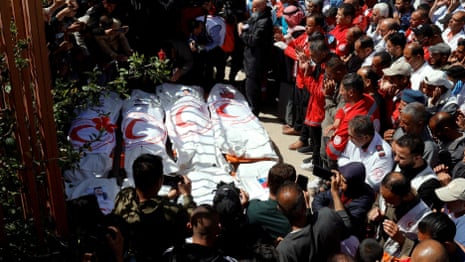Evidence of ‘execution-style’ killings of Palestinian aid workers by Israeli forces, doctor says
Forensic consultant says multiple bullets were used from short range in attack that has caused global outrage
Malak A Tantesh in Gaza, Lorenzo Tondo in Jerusalem, and Julian Borger
A forensic doctor who examined the bodies of some of the 15 paramedics and Palestinian rescue workers shot dead by Israeli forces and buried in a mass grave in southern Gaza has said there is evidence of execution-style killing, based on the “specific and intentional” location of shots at close range.
The Palestinian Red Crescent Society, the Palestinian Civil Defense and UN employees were on a humanitarian mission to collect dead and wounded civilians outside the southern city of Rafah on the morning of 23 March when they were killed and then buried in the sand by a bulldozer alongside their flattened vehicles, according to the UN.
Israel has expanded its aerial and ground attacks in Gaza since ending the ceasefire last month. The prime minister, Benjamin Netanyahu, said on Wednesday it intends to “divide up” the territory.
The killing of the paramedics and rescue workers has triggered outrage around the world and demands for accountability. On Wednesday, the UK foreign secretary, David Lammy, said Gaza was the deadliest place on Earth for humanitarian workers.
“Recent aid worker deaths are a stark reminder. Those responsible must be held accountable,” Lammy said.
Ahmad Dhaher, a forensic consultant who examined five of the dead at Nasser hospital in Khan Younis after they had been exhumed, said all of them had died from bullet wounds. “All cases had been shot with multiple bullets, except for one, which could not be determined due to the body being mutilated by animals like dogs, leaving it almost as just a skeleton,” Dhaher told the Guardian.
“Preliminary analysis suggests they were executed, not from a distant range, since the locations of the bullet wounds were specific and intentional,” he said. “One observation is that the bullets were aimed at one person’s head, another at their heart, and a third person had been shot with six or seven bullets in the torso.”
He emphasised that there was room for uncertainty due to the decomposition of the remains, and that in other cases he reviewed “most of the bullets targeted the joints, such as the shoulder, elbow, ankle, or wrist”.
Two witnesses to the recovery of the bodies told the Guardian on Tuesday that they had seen bodies the hands and legs of which had been tied, suggesting they had been detained before their deaths. A Red Crescent spokesperson, Nebal Farsakh, said on Wednesday that one of the paramedics “had his hands tied together with his legs to his body”.

Bodies of Palestinian rescue workers recovered from mass grave
Dhaher said there was no clear evidence of restraints on the five bodies he examined. “I could not recognise any tying marks on their hands due to the state of decomposition of the five cases I checked, so I can’t be sure of it,” he said.
The Israel Defense Forces and Benjamin Netanyahu’s government have said IDF soldiers opened fire on the ambulances and rescue vehicles because they were “advancing suspiciously toward IDF troops without headlights or emergency signals”. Government officials claimed to have killed a Hamas military operative they named as Mohammad Amin Ibrahim Shubaki, and “eight other terrorists” from Hamas and Palestinian Islamic Jihad, in the attack on 23 March.
However, Shubaki was not among the bodies recovered from the mass grave outside Rafah on Saturday and Sunday, eight of which were identified as Red Crescent ambulance workers, six as civil defence rescue workers, and one as an employee of the UN relief agency Unrwa. The IDF has not responded to questions about why the dead were buried with their vehicles or to reports that some showed signs of having been tied up.
The sole survivor from the shootings on 23 March, Munther Abed, a Red Crescent volunteer, contradicted the official Israeli account, saying the ambulances had been observing safety protocols when they were attacked.
“During day and at night, it’s the same: external and internal lights are on. Everything tells you it’s an ambulance that belongs to the Palestinian Red Crescent. All the lights were on until we came under direct fire,” Abed told The World at One on BBC Radio 4. He denied that anyone from a militant group was in the ambulance.
Abed, who was in the first ambulance to come under fire in the early morning of 23 March, said he survived because he threw himself to the floor at the back of the vehicle when the shooting started. The two paramedics in the front seats of the ambulance were killed in the hail of Israeli gunfire. Abed was detained and interrogated by Israeli soldiers before being released.
The other 13 victims were all in a five-vehicle convoy dispatched some hours later to recover the bodies of the two dead ambulance workers. All of them were shot dead and buried in the same grave.
A Guardian investigation published in February found that more than 1,000 medical staff had been killed across Gaza from the beginning of the conflict on 7 October 2023 – triggered by a Hamas attack on southern Israel that killed 1,200 Israelis – until the beginning of a temporary ceasefire in January. Many hospitals have been reduced to ruins in attacks that a UN Human Rights Council commission concluded amounted to war crimes.
Since ending the two-month ceasefire last month, Israel has vowed to step up its military campaign against Hamas. On Wednesday the defence minister, Israel Katz, said that campaign was expanding to “seize extensive territory” in the Gaza Strip. Netanyahu said Israel intended to build a new security corridor as it was “dividing up the Strip”.
Hospital officials in the occupied Palestinian territory said Israeli strikes overnight and on Wednesday had killed at least 40 people, nearly a dozen of them children.





